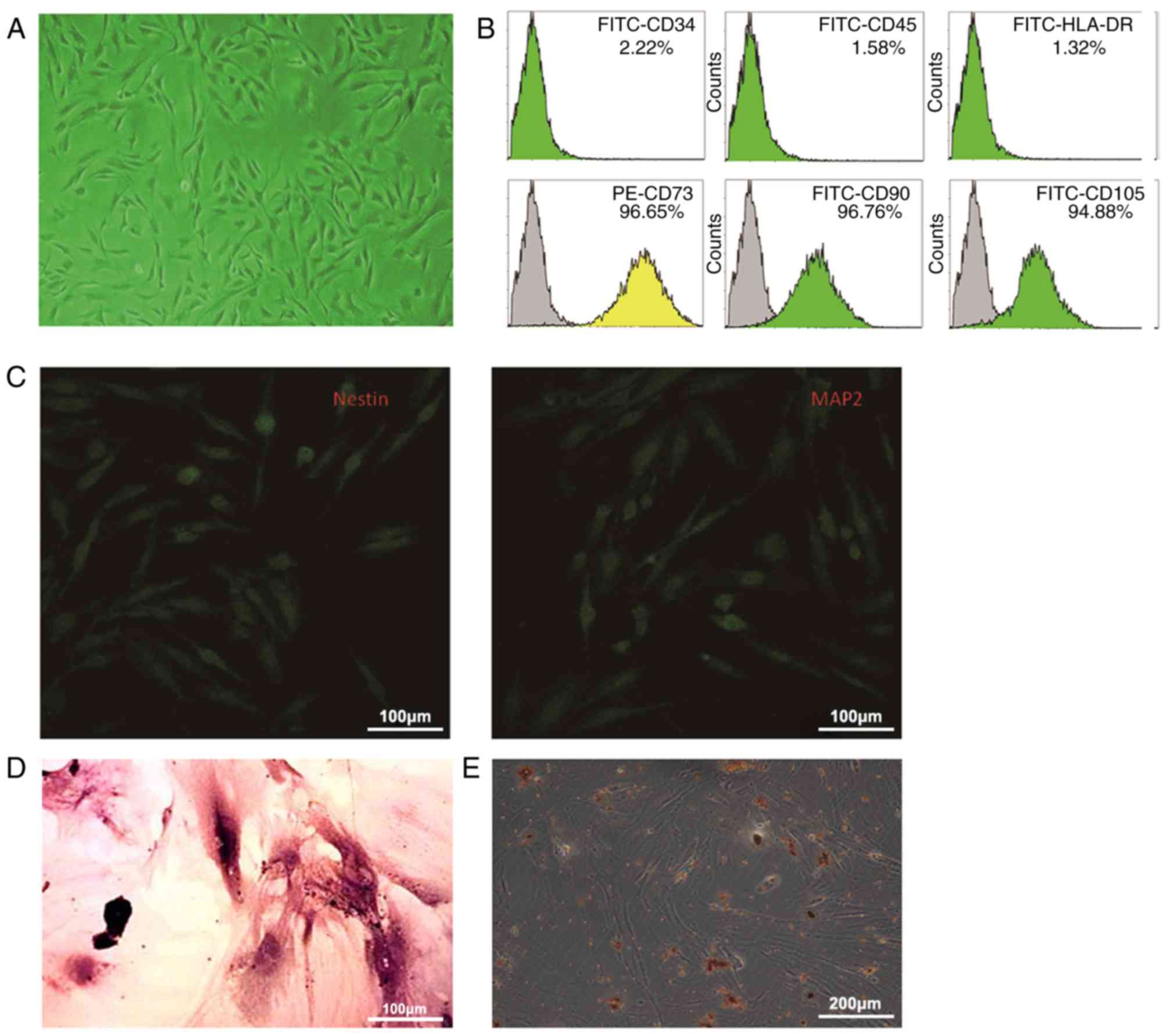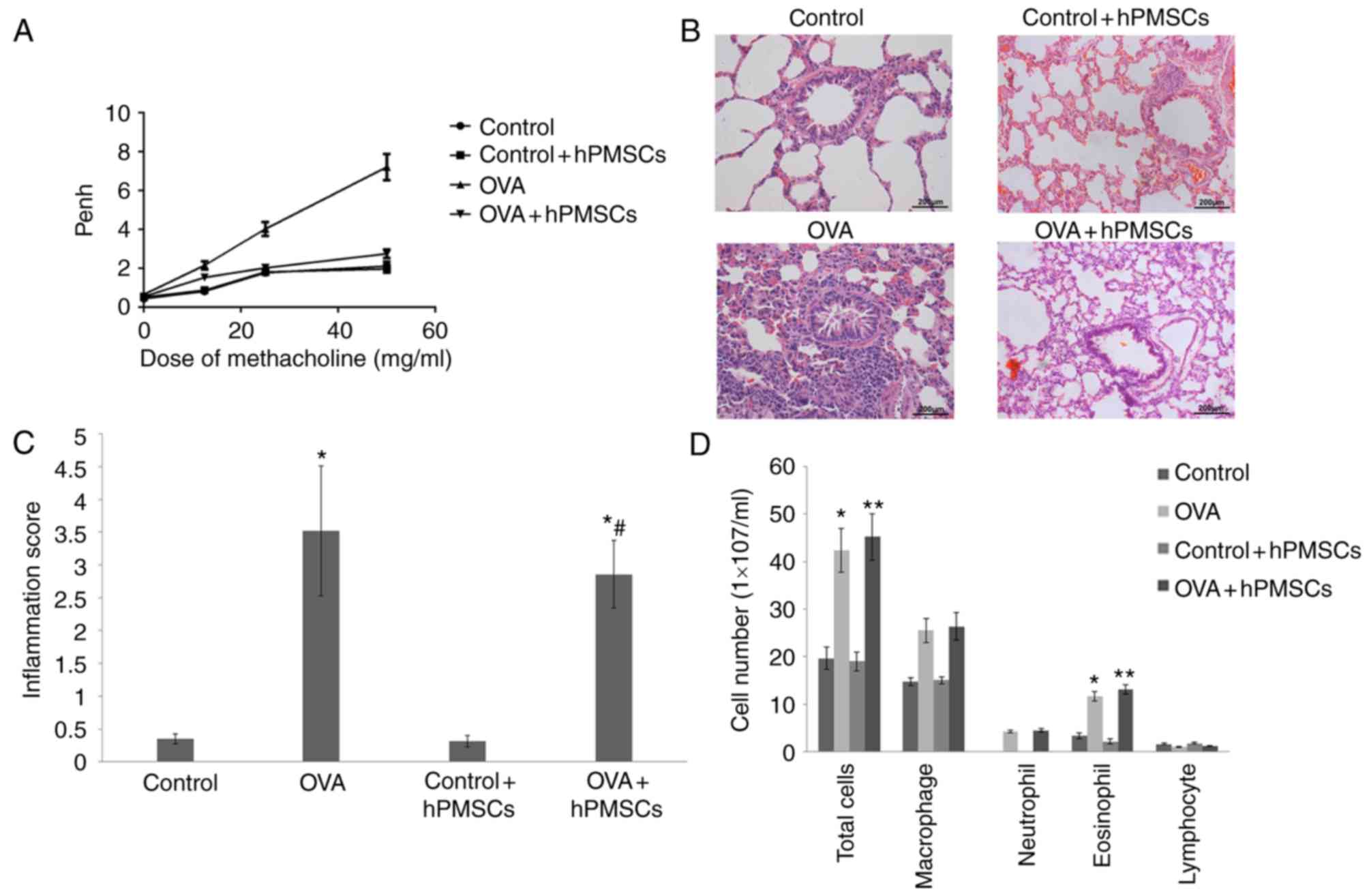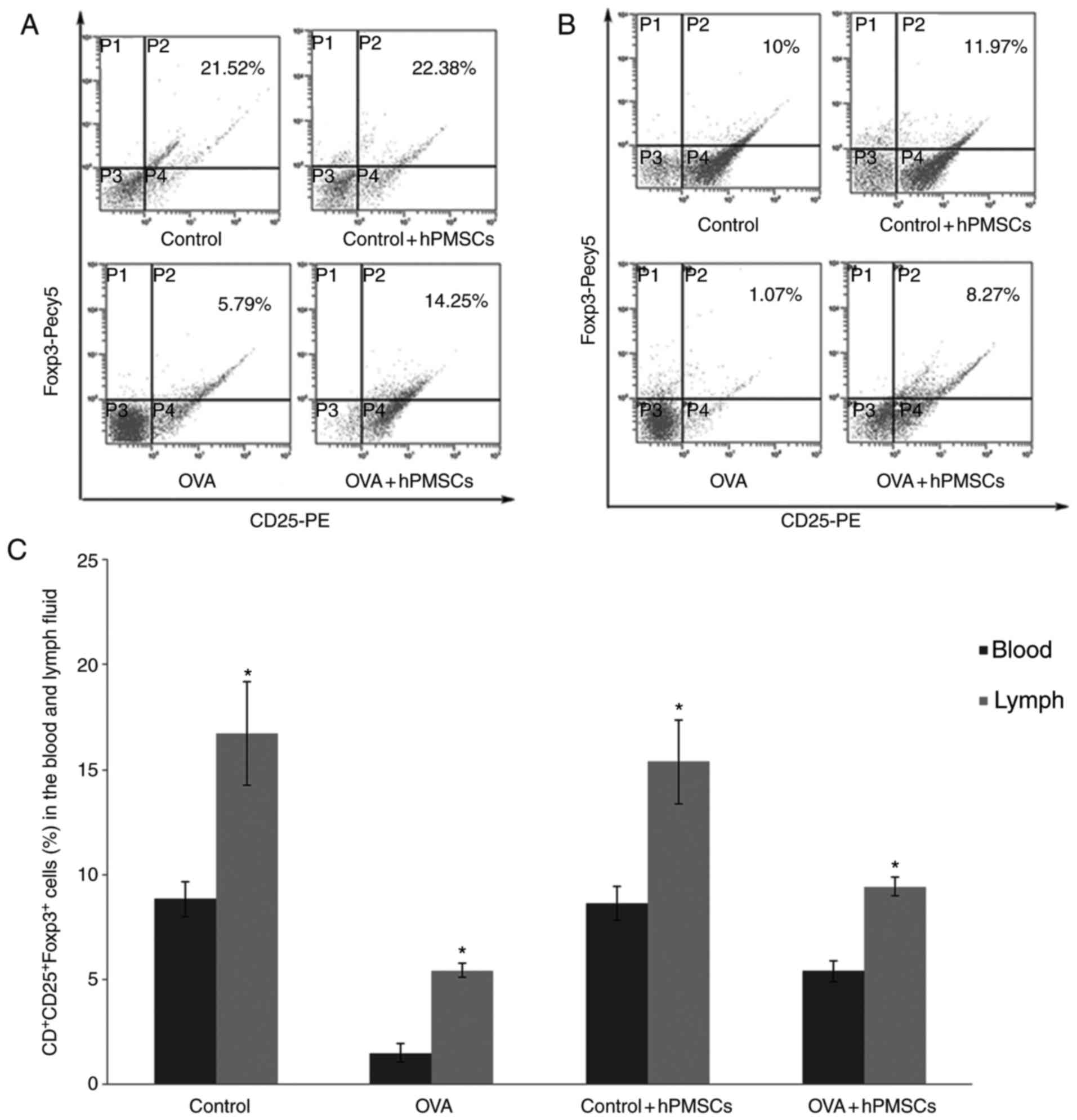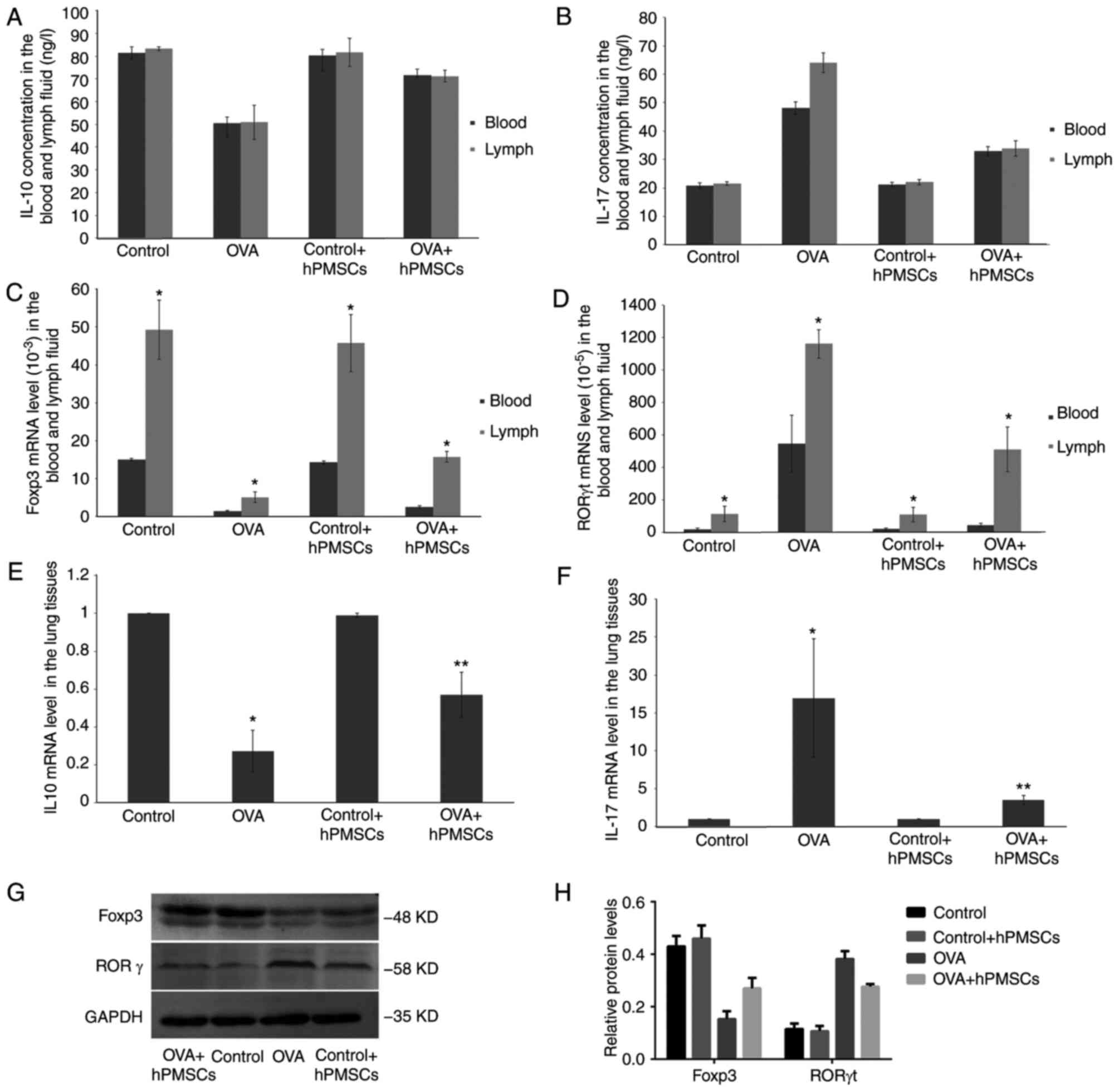|
1
|
Zhang J, Dai J, Yan L, Fu W, Yi J, Chen Y,
Liu C, Xu D and Wang Q: Air pollutants, climate, and the prevalence
of pediatric asthma in urban areas of China. Biomed Res Int.
2016:29351632016.PubMed/NCBI
|
|
2
|
Asher I and Pearce N: Global burden of
asthma among children. Int J Tuberc Lung Dis. 18:1269–1278. 2014.
View Article : Google Scholar : PubMed/NCBI
|
|
3
|
Chen ZH, Wang PL and Shen HH: Asthma
research in China: A five-year review. Respirology. 18 Suppl
3:S10–S19. 2013. View Article : Google Scholar
|
|
4
|
Maddur MS, Miossec P, Kaveri SV and Bayry
J: Th17 cells: Biology, pathogenesis of autoimmune and inflammatory
diseases, and therapeutic strategies. Am J Pathol. 181:8–18. 2012.
View Article : Google Scholar : PubMed/NCBI
|
|
5
|
Lloyd CM and Hawrylowicz CM: Regulatory T
cells in asthma. Immunity. 31:438–449. 2009. View Article : Google Scholar : PubMed/NCBI
|
|
6
|
Jiang H, Wu X, Zhu H, Xie Y, Tang S and
Jiang Y: FOXP3(+)Treg/Th17 cell imbalance in lung tissues of mice
with asthma. Int J Clin Exp Med. 8:4158–4163. 2015.PubMed/NCBI
|
|
7
|
Weaver CT, Hatton RD, Mangan PR and
Harrington LE: IL-17 family cytokines and the expanding diversity
of effector T cell lineages. Annu Rev Immunol. 25:821–852. 2007.
View Article : Google Scholar : PubMed/NCBI
|
|
8
|
Souwer Y, Szegedi K, Kapsenberg ML and de
Jong EC: IL-17 and IL-22 in atopic allergic disease. Curr Opin
Immunol. 22:821–826. 2010. View Article : Google Scholar : PubMed/NCBI
|
|
9
|
Hou X, Wan H, Ai X, Shi Y, Ni Y, Tang W
and Shi G: Histone deacetylase inhibitor regulates the balance of
Th17/Treg in allergic asthma. Clin Respir J. 10:371–379. 2016.
View Article : Google Scholar : PubMed/NCBI
|
|
10
|
Wei Y, Liu B, Sun J, Lv Y, Luo Q, Liu F
and Dong J: Regulation of Th17/Treg function contributes to the
attenuation of chronic airway inflammation by icariin in
ovalbumin-induced murine asthma model. Immunobiology. 220:789–797.
2015. View Article : Google Scholar : PubMed/NCBI
|
|
11
|
Kanagaratham C and Radzioch D: Allergic
Asthma: A summary from genetic basis, mouse studies, to diagnosis
and treatment. Curr Pharm Des. 22:6261–6272. 2016. View Article : Google Scholar : PubMed/NCBI
|
|
12
|
Moodley Y, Manuelpillai U and Weiss DJ:
Cellular therapies for lung disease: A distant horizon.
Respirology. 16:223–237. 2011. View Article : Google Scholar : PubMed/NCBI
|
|
13
|
Sinclair K, Yerkovich ST and Chambers DC:
Mesenchymal stem cells and the lung. Respirology. 18:397–411. 2013.
View Article : Google Scholar : PubMed/NCBI
|
|
14
|
Cho KS, Park MK, Kang SA, Park HY, Hong
SL, Park HK, Yu HS and Roh HJ: Adipose-derived stem cells
ameliorate allergic airway inflammation by inducing regulatory T
cells in a mouse model of asthma. Mediators Inflamm.
2014:4364762014. View Article : Google Scholar : PubMed/NCBI
|
|
15
|
Lee SH, Jang AS, Kwon JH, Park SK, Won JH
and Park CS: Mesenchymal stem cell transfer suppresses airway
remodeling in a toluene diisocyanate-induced murine asthma model.
Allergy Asthma Immunol Res. 3:205–211. 2011. View Article : Google Scholar : PubMed/NCBI
|
|
16
|
Vellasamy S, Sandrasaigaran P, Vidyadaran
S, George E and Ramasamy R: Isolation and characterisation of
mesenchymal stem cells derived from human placenta tissue. World J
Stem Cells. 4:53–61. 2012. View Article : Google Scholar : PubMed/NCBI
|
|
17
|
Abumaree MH, Al Jumah MA, Kalionis B,
Jawdat D, Al Khaldi A, AlTalabani AA and Knawy BA: Phenotypic and
functional characterization of mesenchymal stem cells from
chorionic villi of human term placenta. Stem Cell Rev. 9:16–31.
2013. View Article : Google Scholar : PubMed/NCBI
|
|
18
|
Luan X, Li G, Wang G, Wang F and Lin Y:
Human placenta-derived mesenchymal stem cells suppress T cell
proliferation and support the culture expansion of cord blood
CD34+ cells: A comparison with human bone marrow-derived
mesenchymal stem cells. Tissue Cell. 45:32–38. 2013. View Article : Google Scholar : PubMed/NCBI
|
|
19
|
Liu KJ, Wang CJ, Chang CJ, Hu HI, Hsu PJ,
Wu YC, Bai CH, Sytwu HK and Yen BL: Surface expression of HLA-G is
involved in mediating immunomodulatory effects of placenta-derived
multipotent cells (PDMCs) towards natural killer lymphocytes. Cell
Transplant. 20:1721–1730. 2011. View Article : Google Scholar : PubMed/NCBI
|
|
20
|
Yang M, Zhao X, Liu Y, Tian Y, Ran X and
Jiang Y: A role for WNT1-inducible signaling protein-1 in airway
remodeling in a rat asthma model. Int Immunopharmacol. 17:350–357.
2013. View Article : Google Scholar : PubMed/NCBI
|
|
21
|
Trzil JE, Masseau I, Webb TL, Chang CH,
Dodam JR, Cohn LA, Liu H, Quimby JM, Dow SW and Reinero CR:
Long-term evaluation of mesenchymal stem cell therapy in a feline
model of chronic allergic asthma. Clin Exp Allergy. 44:1546–1557.
2014. View Article : Google Scholar : PubMed/NCBI
|
|
22
|
Ogulur I, Gurhan G, Aksoy A, Duruksu G,
Inci C, Filinte D, Kombak FE, Karaoz E and Akkoc T: Suppressive
effect of compact bone-derived mesenchymal stem cells on chronic
airway remodeling in murine model of asthma. Int Immunopharmacol.
20:101–109. 2014. View Article : Google Scholar : PubMed/NCBI
|
|
23
|
Zeng SL, Wang LH, Li P, Wang W and Yang J:
Messenchymal stem cells abrogate experimental asthma by altering
dendritic cell fuction. Mol Med Rep. 12:2511–2520. 2015. View Article : Google Scholar : PubMed/NCBI
|
|
24
|
Yen BL, Huang HI, Chien CC, Jui HY, Ko BS,
Yao M, Shun CT, Yen ML, Lee MC and Chen YC: Isolation of
multipotent cells from human term placenta. Stem Cells. 23:3–9.
2005. View Article : Google Scholar : PubMed/NCBI
|
|
25
|
Lee RH, Kim B, Choi I, Kim H, Choi HS, Suh
K, Bae YC and Jung JS: Characterization and expression analysis of
mesenchymal stem cells from human bone marrow and adipose tissue.
Cell Physiol Biochem. 14:311–324. 2004. View Article : Google Scholar : PubMed/NCBI
|
|
26
|
Lee CG, Link H, Baluk P, Homer RJ,
Chapoval S, Bhandari V, Kang MJ, Cohn L, Kim YK, McDonald DM and
Elias JA: Vascular endothelial growth factor (VEGF) induces
remodeling and enhances TH2-mediated sensitization and inflammation
in the lung. Nat Med. 10:1095–1103. 2004. View Article : Google Scholar : PubMed/NCBI
|
|
27
|
Livak KJ and Schmittgen TD: Analysis of
relative gene expression data using real-time quantitative PCR and
the 2(-Delta Delta C(T)) method. Methods. 25:402–408. 2001.
View Article : Google Scholar : PubMed/NCBI
|
|
28
|
Mariñas-Pardo L, Mirones I, Amor-Carro O,
Fraga-Iriso R, Lema-Costa B, Cubillo I, Rodríguez Milla MÁ,
García-Castro J and Ramos-Barbón D: Mesenchymal stem cells regulate
airway contractile tissue remodeling in murine experimental asthma.
Allergy. 69:730–740. 2014. View Article : Google Scholar : PubMed/NCBI
|
|
29
|
Srour N and Thébaud B: Stem cells in
animal asthma models: A systematic review. Cytotherapy.
16:1629–1642. 2014. View Article : Google Scholar : PubMed/NCBI
|
|
30
|
Li X, Bai J, Ji X, Li R, Xuan Y and Wang
Y: Comprehensive characterization of four different populations of
human mesenchymal stem cells as regards their immune properties,
proliferation and differentiation. Int J Mol Med. 34:695–704. 2014.
View Article : Google Scholar : PubMed/NCBI
|
|
31
|
Doe C, Bafadhel M, Siddiqui S, Desai D,
Mistry V, Rugman P, McCormick M, Woods J, May R, Sleeman MA, et al:
Expression of the T helper 17-associated cytokines IL-17A and
IL-17F in asthma and COPD. Chest. 138:1140–1147. 2010. View Article : Google Scholar : PubMed/NCBI
|
|
32
|
Wilson RH, Whitehead GS, Nakano H, Free
ME, Kolls JK and Cook DN: Allergic sensitization through the airway
primes Th17-dependent neutrophilia and airway hyperresponsiveness.
Am J Respir Crit Care Med. 180:720–730. 2009. View Article : Google Scholar : PubMed/NCBI
|
|
33
|
Barczyk A, Pierzchala W and Sozanska E:
Interleukin-17 in sputum correlates with airway hyperresponsiveness
to methacholine. Respir Med. 97:726–733. 2003. View Article : Google Scholar : PubMed/NCBI
|
|
34
|
Lathrop MJ, Brooks EM, Bonenfant NR,
Sokocevic D, Borg ZD, Goodwin M, Loi R, Cruz F, Dunaway CW, Steele
C and Weiss DJ: Mesenchymal stromal cells mediate Aspergillus
hyphal extract-induced allergic airway inflammation by inhibition
of the Th17 signaling pathway. Stem Cells Transl Med. 3:194–205.
2014. View Article : Google Scholar : PubMed/NCBI
|
|
35
|
Kim HP and Leonard WJ: CREB/ATF-dependent
T cell receptor-induced FoxP3 gene expression: A role for DNA
methylation. J Exp Med. 204:1543–1551. 2007. View Article : Google Scholar : PubMed/NCBI
|
|
36
|
Goodwin M, Sueblinvong V, Eisenhauer P,
Ziats NP, LeClair L, Poynter ME, Steele C, Rincon M and Weiss DJ:
Bone marrow-derived mesenchymal stromal cells inhibit Th2-mediated
allergic airways inflammation in mice. Stem Cells. 29:1137–1148.
2011. View Article : Google Scholar : PubMed/NCBI
|
|
37
|
Giuliani M, Fleury M, Vernochet A,
Ketroussi F, Clay D, Azzarone B, Lataillade JJ and Durrbach A:
Long-lasting inhibitory effects of fetal liver mesenchymal stem
cells on T-lymphocyte proliferation. PLoS One. 6:e199882011.
View Article : Google Scholar : PubMed/NCBI
|
|
38
|
Fontenot JD, Gavin MA and Rudensky AY:
Foxp3 programs the development and function of CD4+CD25+ regulatory
T cells. Nat Immunol. 4:330–336. 2003. View
Article : Google Scholar : PubMed/NCBI
|
|
39
|
Ge X, Bai C, Yang J, Lou G, Li Q and Chen
R: Intratracheal transplantation of bone marrow-derived mesenchymal
stem cells reduced airway inflammation and up-regulated
CD4+CD25+ regulatory T cells in asthmatic
mouse. Cell Biol Int. 37:675–686. 2013. View Article : Google Scholar : PubMed/NCBI
|
|
40
|
Ivanov II, McKenzie BS, Zhou L, Tadokoro
CE, Lepelley A, Lafaille JJ, Cua DJ and Littman DR: The orphan
nuclear receptor RORgammat directs the differentiation program of
proinflammatory IL-17+ T helper cells. Cell. 126:1121–1133. 2006.
View Article : Google Scholar : PubMed/NCBI
|
|
41
|
Zhao J, Lloyd CM and Noble A: Th17
responses in chronic allergic airway inflammation abrogate
regulatory T-cell-mediated tolerance and contribute to airway
remodeling. Mucosal Immunol. 6:335–346. 2013. View Article : Google Scholar : PubMed/NCBI
|



















